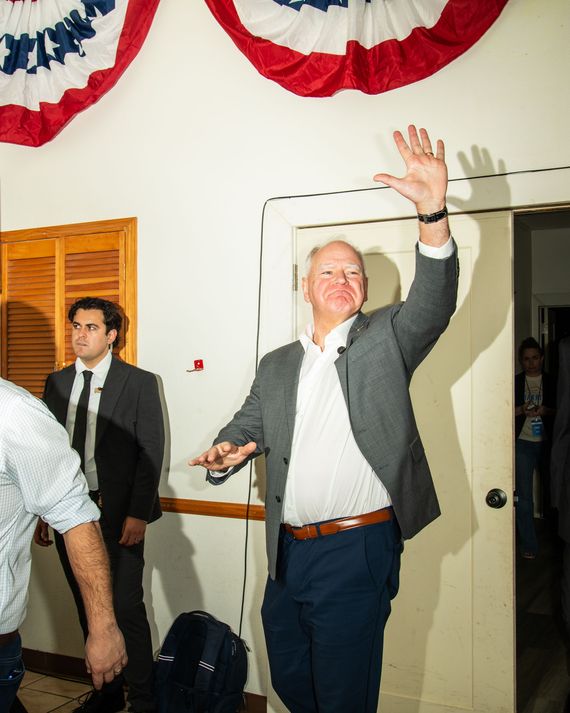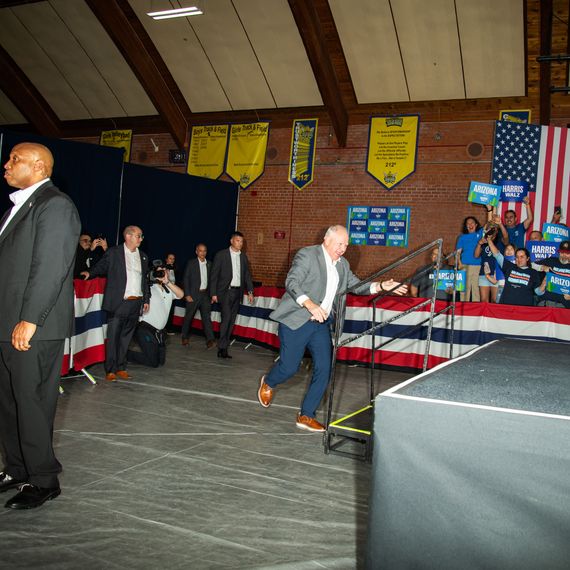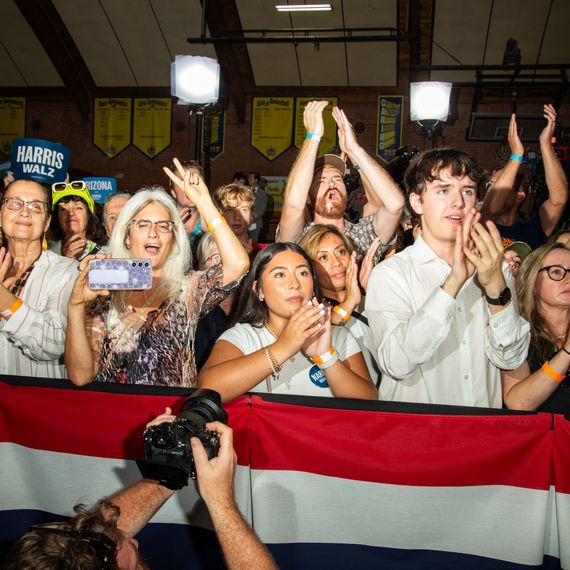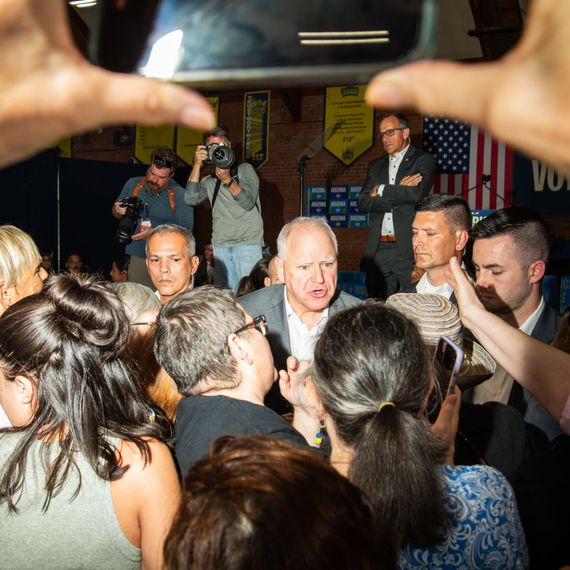

Tim Walz with Senate candidate Ruben Gallego in Chandler, Arizona, October 9.
Photo: Brian Finke for New York Magazine
Small talk is physical. When well executed it is a collection of gentle gestures well matched to the speaker, a unity of mind and body that never rises to the level of consciousness. When Tim Walz listens, he waits with his brows knit (and it helps, here, to have massive, bushy brows) and his hands clasped, thumbs touching. When he laughs, he throws his head backward and his mouth opens wide (and it helps, here, to have an unusually large mouth), and when his head snaps forward, he has a retort ready. At a great distance from someone he is meeting, he will throw both hands in the air, as if overcome with the joy of seeing a functionary from a minor city. At a middle distance, he will deploy two finger guns; at a shorter distance, one. He is given to go for a handshake, which, when appropriate, he may pull into a hug, and which, when appropriate, he may punctuate with a slap on the back. One might say he knows what he is doing, but of course, all the effect is in the fact that he does not.
There is no obvious connection between an ability to commune with strangers and an ability to govern; one might even be inclined to posit the opposite, in that an easy fluidity masks false intention. The fact remains that Walz is so natural with people that every encounter comes across, through no fault of his own, as trolling his opponent, a man who cannot so much as order a doughnut or answer a question (“What makes you smile?”) without expressing a mysteriously motivated sense of resentment (“I smile at a lot of things, including bogus questions from the media”).
In defense of J.D. Vance’s inability to solicit dessert under pressure, there is really no reason anyone should be able to radiate charisma throughout the relentless staging of a modern political campaign. We have gathered here at Otro Cafe in Phoenix to watch Tim Walz select a snack. With a kind of self-aware seriousness, a playful commitment to the importance of the decision, Tim Walz chooses banana bread. Walz, Doug Emhoff, Cole Emhoff, and Cole’s wife, Greenley Littlejohn, take their pastries to a table apparently off limits to professional journalism, leaving the cameras staring down at Hope Walz, a 23-year-old whose precise manner of conception had recently become a matter of intense interest for consumers of right-wing news. Hope adjusts her shirt under the lights. “I feel exposed,” she says, absolutely the least weird thing one can say under these circumstances, in a clip that would, hours later, be retrievable on a YouTube channel called HOT POLITICAL CLIPS AND VIDEO.
By late July, there were modes of speaking to which we had become accustomed. There was Biden unable to say the word abortion as women lost the right to one. There was Biden being outright incoherent. There was Trump’s rambling, increasingly senescent brutality. There was, to someone very tuned in, Pete Buttigieg’s perfectly polished parallelism, his clean syllogistic strikes. And then there were five transformative minutes with Tim Walz on Morning Joe. “Weird” is what changed the discourse that day, but weird was only constituent of a larger ability to focus the miasma of Democratic panic into crisp snips of language. Here were stream-of-consciousness rapid-fire applause lines, phrases that reflected back on the audience a sense of its collective exasperation: “Mind your own damn business … Where in the heck are you gonna find a private school in a town of 400? … None of my hillbilly cousins went to Yale.”
Tim Walz, as anyone who has tried to quote him in print well knows, does not speak in “sentences” nor adhere to a common “grammar.” This is a dream sequence, scenes conjured out of thin air and only later explained. “They always do, Oh, the guy sitting in Racine, Wisconsin, in the bar, what’s really concerning him? I damn sure guarantee you it’s not banning Animal Farm.” You do not know where you are going until you’ve arrived. “You come home from work. You throw the Frisbee to your pup, he gets it, you give your good boy a belly rub,” he said in February, inexplicably. And only then: “Picture that guy” — Trump — “doing anything normal like that.” On August 5, no one outside Minnesota with a healthy relationship to current events knew the name Tim Walz. A few weeks later, he was the best-liked candidate on either ticket in the most high-stakes presidential race anyone could remember.
At a campaign rally at Palo Verde high school in Tucson.
Photo: Brian Finke for New York Magazine
The ability to be fully present in the selection of banana bread suggests an unusual distribution of attention; indeed, Walz once told a classroom of high-school students that he had ADHD.
“Undiagnosed,” his wife, Gwen, gently added.
“No, I’m not diagnosed,” he said, “but it’s pretty obvious.”
At Mankato West High School, Gwen taught English and Tim taught geography, coached football, ran the basketball clock, built sets for plays, and brought hundreds of kids on long educative trips to China. He was faculty adviser to the Gay Straight Alliance in 1999, a time when no state recognized gay marriage. The adviser, he later told J. Patrick Coolican at the Star Tribune, “needed to be the football coach, who was the soldier and was straight and was married.”
His political origin story, like all such stories, feels overpolished, a touch too narratively useful, but the facts are there. In 2004, two teenagers, Matt Klaber and Sierra Burkhart, had been denied entry to a pro-Bush event on suspicion of Democratic tendencies. They attempted to get into a second rally with the most inoffensive adult imaginable, universally beloved teacher Tim Walz. They were again denied, and though Walz managed to argue his way in (“I’m in the National Guard, and I’m here to see my commander-in-chief”), he was indignant. The field organizer of the local Kerry campaign was Leah Solo, a former student of Gwen’s. Tim and Gwen folded right in.
The Walzes lived in Minnesota’s First District, where Republican Gil Gutknecht had won the last election by 24 points, and the one before that by 27 points, and the one before that by 15, all the way back to 1994, the year he ran on a pledge to serve no more than 12 years. Gutknecht started calling that pledge “one of my youthful mistakes.”
A Walz would face Gutknecht in 2006; whether it would be Tim or Gwen was initially unclear. “She was as vocal and as active and as out front and savvy as he was,” says Klaber. But Tim was a white man, a hunter, in a conservative district. He had endless stores of energy. He had a kind of mischief about him that drew people in. “The fun Walz and the other Walz,” Gwen sometimes said.
Tim took unpaid leave from his teaching job. The campaign had no money and no expertise, which was a gift, because had they had expertise, they would have known not to run without money. “His communications director, his finance director, his field coordinators, none of them had paid political positions in the past,” says Terry Morrow, who was involved in the campaign and running for a spot in the Minnesota legislature at the time. “They’re in their 20s. They don’t know that they can’t win.”
Klaber and Burkhart, the two teens, put up a website. Burkhart Photoshopped a logo: yellow and white on a blue background, all in Gill Sans, a font Burkhart says she “chose entirely” in reference to the opposition. The campaign had money for precisely one “Walz 2006” banner, but they only had the funds for two colors. Burkhart removed yellow from the design. “Everything,” says Burkhart, “felt like an uphill battle.” For Burkhart herself, the campaign was a place to put her energy years before she sought a gender transition. “It was the best way of distracting myself,” she says. “I don’t know. It was really important.” At 17, she was regularly introducing Walz at campaign events. “Never follow a better speaker,” he always said as she walked offstage.
Minnesota’s First District is rural, dotted with tiny towns the Mankato kids only knew about because they’d heard them mentioned during tornado warnings. Each tornado-town had a festival, and each festival had a parade. The campaign joined the float sponsored by the Minnesota Democratic-Farmer-Labor Party (“It’s not like we had money to join the parades ourselves,” says Solo), and Walz trotted behind the banner, attempting to shake hands with everyone. He kept falling behind. “They made a sign saying ‘Meet Tim Walz,’” recalls Morrow. “And a kid would run next to Tim with a stick with this sign so that the people at the parade would know. So there’s Tim running back and forth, zigzagging down the parade route with this poor kid trying to keep up.”
By that fall, they were raising real money. Tim Walz had been campaigning 90 hours a week for seven months. On the last day of campaigning, he visited 12 towns. A woman on disability offered his campaign her last $17. Walz’s voice was hoarse. He had a newborn at home. “Look at the moon,” he said to a reporter.
At the Holiday Inn in Mankato, the Walzes waited for results under the blue, white, and yellow signs they could then afford. Walz’s mood was tense until he won conservative Nobles County. “When we got that news,” says Burkhart, “I just saw a change in him. He realized at that moment that this wasn’t a pipe dream anymore.” Burkhart herself was not able to vote for him; although she turned 18 just before the election, she was no longer living in the district. She would vote for Tim Walz for the first time 20 years later, on the day I called her.
At the Tucson rally.
Photo: Brian Finke for New York Magazine
Tim Walz had never been a moderate; he simply looked like one as he pulled you into a hug. “At the age of 18,” Klaber says, “I fancied myself a bit of a strategist and was like, Yeah, I know you support gay marriage, but you don’t have to talk about it in this district. Don’t say it. He was like, Fuck it. He did. He did.”
There would be six terms as congressperson, even while nearby districts fell to the nativism of Michele Bachmann and Steve King. There would be two terms as governor. “He’s always just literally running,” says an adviser. “He’ll see in the news there’s a fire or a storm somewhere in Minnesota.” Walz will want to go to the site: “We’ve got to go; let’s go tomorrow. We’ve got to go.”
“The Republicans always say, You don’t learn anything from us,” Walz said in February. “Yes, I do. I learned what a one-vote majority is: It’s a majority.” In 2023, Minnesota Democrats working with a trifecta and a budget surplus legalized marijuana, instituted protections for abortion and transgender rights, restored voting rights, provided a tax credit to low-income parents, passed gun-control measures and paid family leave, banned conversion therapy, provided free breakfast and lunch to public-school children, waived college tuition for low-income students, and on and on, an onslaught of progressive achievement we do not have the word count to exhaust. This was only possible because he coded conservative to a comic degree: not just a football coach but a coach who had helped usher a losing team to a triumphant state championship. Not just someone who knew his way around a gun; someone who kept a gun in his locker in high school. “I’ll go ahead and put my credibility up against anyone else when it comes to this issue,” he said in his 2023 State of the State address, which was surprisingly combative for a guy riding what the press would call “the Minnesota miracle.” “I’m a veteran and a hunter,” he said. “I was one of the best shots in Congress, and I got the dang trophies to prove it.”
“How does it feel to be outshot every year by a liberal gun grabber?” he said later, taunting his Republican colleagues. “Most of these guys have never been around guns, it’s just like a persona.”
Tim Walz had a persona, too, but it was authentically held and he knew how to play with it. He posted terrible selfies, posting like a man who had no idea how to post, online in a way that read offline. He could chase national office while projecting none of the unseemly striver sweat of a J.D. Vance or a Josh Shapiro. In 2023, Walz was already trying out lines: “They’re banning books in their schools. We’re banishing hunger from ours.” On Juneteenth as a federal holiday: “They’re afraid of facing up to this great nation’s entire history. And maybe here in Minnesota we’re just made of stronger stuff.” “Who is asking for this?” is somehow a question no one else had asked.
By 2023 Democrats were soliciting Biden surrogates to come to their states and give talks. “His whole thing was,” says an adviser, “ ‘I want to go to the states that nobody else is going to go to. I want to go to the state party dinner where they can’t get a guest. They need to be inspired too, and nobody’s ever going to go there.’” And so instead of going to states like South Carolina, Georgia, and Nevada, Walz went to Topeka, Indianapolis, Kansas City, and Omaha. “Mind your own damn business,” he said in Fargo in November, at a small event space above a local restaurant, to an audience of 50 or 75 senior citizens. There was no podium; he stood at a table with a handheld microphone. It was basically the same speech he later gave in Philadelphia, standing beside Kamala Harris, to millions of people.
In Minnesota at football game between Mankato East and Mankato West high school, where Walz once taught, October 11.
Photo: Brian Finke for New York Magazine
On Tim Walz’s massive campaign jet (“A New Way Forward”), I count nine normal suited, ear-pieced Secret Service agents and two counterassault agents, the latter of whom are in tactical helmets. A 757 is so large that some private airports do not have stairs sufficiently tall to accommodate it. When Walz descends the large staircase, a security agent opens the door to one of a dozen vehicles that will lead the way through streets cleared for the convoy by law enforcement, past motorcycles parked in the middle of the road and parked police cars, doors open, ostentatiously making way.
The motorcade sweeps by clean rows of new housing. Yesterday it was 108 degrees; today it will be 105. The fact that Phoenix is both one of the country’s fastest-warming big cities and one of its fastest growing suggests a disinclination to ask certain questions, questions that will not be asked at the John S. McCain III VFW Post 7401, where Jim McCain introduces Walz to a roomful of supportive veterans. After he was pulled onto the presidential ticket, a speech consultant instructed Walz to learn to “ride the wave” of audience applause. He shakes hands, gets into the black SUV, on the big plane in Phoenix, off the big plane in Tucson.
Walz gave an extraordinarily well-received convention speech and a less inspiring debate performance; his hallucinatory speaking style is not easily adapted to an antagonistic back-and-forth. A decision has been made not to let the candidate converse with the traveling press, and so we are consigned to the back of the plane, left in vans, corralled behind barriers. In our mobile prison we go a little mad. (“Greenley Littlejohn,” says a reporter who appears to have been doing this for a very long time, “Greenley Littlejohn. I can’t stop saying it. It’s like an intrusive thought.”) Local, more knowledgeable reporters point out that until recently, he wouldn’t stop talking to them. And yet, for all that access, no one has been able to explain Tim Walz, who remains, even to one of his closest advisers, “an enigma.” There is no memoir through which one can glean suggestive subtext. It is evident that the governor cannot stop moving, but it is unclear what would happen if he tried. In 2016, his brother, a fellow public-school teacher who is also, like Walz, married to a public-school teacher, was crushed to death by a tree. He had been camping with his son, 14-year-old Jacob, in Minnesota’s Boundary Waters wilderness. Jacob was airlifted out with a broken back, pelvis, legs, ankle, and wrist. “Jake opened his eyes at 5:50 p.m. and looked at his mom!” Tim Walz wrote in a CaringBridge post days later. “He wiggled his toes!” And later: “The pain we are feeling for Jake is so raw to be almost unbearable. I can’t begin to understand why this beautiful child is being asked to endure this burden.” Walz was in the middle of a difficult gubernatorial campaign. “We’ve all been forever changed,” he wrote, as Jacob slowly recovered. “Grief still washes over us at unexpected times during each day.”
It is easier to say what is clearly not motivating Walz. Among his favorite books is W. Somerset Maugham’s The Razor’s Edge, a didactic novel about a veteran who confounds everyone around him by expressing no interest in material wealth or conventional ambition. The governor has no stocks or bonds. He owns no property. (“Think about it,” tweeted one of Walz’s Minnesota political opponents in August. “A homeless man is running for VP.”) Until August, he flew coach; he flew coach, in fact, to meet Kamala Harris to interview for the job of vice-presidential candidate.
We go up the giant plane stairs in Phoenix, off in Tucson, back into the van, the streets cleared. On the roof of Palo Verde High, snipers stand under a small blue tent rippling in the desert wind. We are hours late. Backed by inspirational posters of questionable persuasive power (“We Believe Sportsmanship Is an Expectation”), a small-business owner named Raul is talking about his seven daughters and their rights to bodily autonomy and this man who will protect it. Walz runs onstage. The scoreboard reads 20-24. “I’m ready,” says Walz, “to run through the wall for Raul on that!”
“I love you,” someone shouts from the crowd. Walz points straight at him. “You love America!” Walz has neither notes nor teleprompter. It is difficult to make policy physical, but Walz could mime the agenda if pressed. He has a lexicon of moves. There’s one for the word revulsion, which he presumes the audience has as they hear Trump’s latest forays into ethnonationalist accusations of pet consumption — Walz’s hands rise in a waving motion — and one for the word conversation — a kind of swatting back and forth — which is what his mom is engaged in now that she has a hearing aid. It is a speech about the space Republicans have ceded, the “Party of Freedom” curdled into obsessive transgression: “free to invade your exam room, to invade your school library, to invade your bedroom, and have government be just small enough,” and his arms go wide, “to be in every damn part of your life that they shouldn’t be.”
He’s on the subject of Social Security when he swerves. “The other freedom is — and being in this space, as a schoolteacher, and knowing the joy that’s here, and knowing the parents” — and here he crouches, as if toward a kid — “who dress their little ones in their best clothes and they send them off to school, and that teacher is waiting there to shake their little hands and welcome them into the world of learning.” The audience is with him, with the little kid in his new shoes and supportive parents, here, in this school gym. “Our kids need to be free to be kids and go to school without being shot dead in their classroom.” He looks legitimately angry. The little kid in his best clothes with the supportive parents has been executed. “We got 27 days,” he says. “All gas, no breaks … Let’s go.” The audience unleashes a wave of stamping, screaming. He rides it.
Source link








